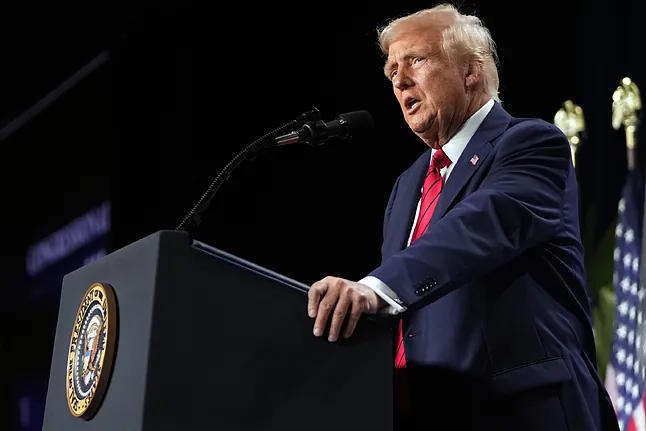On Sunday afternoon, several officials from international organizations such as the World Bank and the Inter-American Development Bank (BIS) were not allowed to enter the United States. The reason? These officials are of Colombian nationality. Their G-4 visas, used by these organizations, had been suspended by the United States after the Government of Bogotá refused to admit US military planes with undocumented immigrants into its territory. The left-wing government of Gustavo Petro had initially agreed to accept the deportees but changed its mind while the planes were already in the air. Their argument was that these individuals could be sent to Colombia but on civilian flights.
Washington threatened to impose 25% tariffs on all Colombian imports and invalidated all visas from that country. While Trump's special advisor for Latin America, Mauricio Claver Carone - who spent much of his adolescence in Madrid - negotiated with Bogotá, panic spread among the approximately 355,000 Colombians legally residing in the United States. Their migratory future was uncertain. If they left the country, their visas might not be valid upon return. If their visas expired, they would not be renewed. Even the situation of the Colombian ambassador to the United States, Daniel García-Peña, who was in Colombia at that time, was surrounded by uncertainty. Trump prevailed over Petro in three hours.
The harshness of the White House has raised doubts among international organizations about their presence in Washington. Last winter, the International Monetary Fund (IMF) considered the possibility of transferring more operations to other countries in the future, as the World Bank did when its number two was Kristalina Georgieva, who is now the Managing Director of the IMF.
The reason was the tightening of visas in the United States under Biden and the increasing cost of living in the American capital. Now, with Trump, the issue extends to the immunity of agency officials. This could pose a problem in attracting talent at a time when the private sector offers significantly higher salaries and more varied job opportunities than any multilateral organization. The IMF will not leave because its headquarters can only be in the country that contributes the most to its capital, which is the United States. However, it could open satellite offices in other countries.
The problems faced by these organizations are a consequence of the chaos that the Government of Donald Trump has created in the international system that Washington established after World War II and within the US government itself. Last Friday, without prior notice, the State Department suspended funding for all projects it is involved in abroad, ranging from paying salaries to officials in countries like Ukraine to mine clearance or student training programs. Even in cases where funds are committed, the State Department ordered legal avenues to freeze them.
The ban once again affects multilaterals, as well as non-profit organizations and NGOs, and threatens the presence in the United States of foreign workers involved in these projects, as their salaries were suspended overnight and, if operations are not resumed, they will have to leave the country within a month.
On Tuesday, these measures extended beyond the State Department to cover all US international cooperation aid, including the transfer of AIDS and malaria drugs to developing countries. The measures are accompanied by the suspension of nearly a trillion euros in domestic transfers within the US for research projects, investment aid, and various initiatives until, as the Government claims, it is determined that they do not promote "Marxist equality, 'transgenderism' [i.e., gender change assistance], and social engineering policies through the Green New Deal," the latter being a project that literally does not exist and aims to carry out an energy transition in the United States.
Pensions and the private health program for the elderly (Medicare) will not be 'frozen.' However, medical assistance for low-income individuals (Medicaid), covering 92 million people, or 27.6% of the population, and the distribution of food coupons relied upon by 41 million Americans (12.3% of the population) for sustenance, as well as experimental treatments for various diseases like cancer, could be affected. Last week, Trump also prohibited health agencies from exchanging any information.
